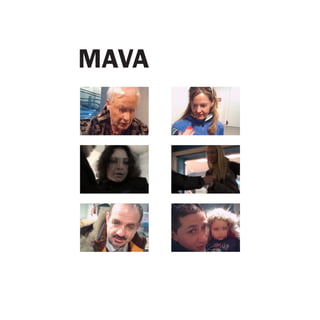Leporello
- 1. MAVA
- 2. 2 MAVA MA VA is an ironic and provocative intervention that tries to make visible the acts of categorisation that have become South Tyroleanâs reality but are still taboo in public discussion. Passers-by in a Bolzano Shopping mall were asked to wear a badge that visibly assigned them to either the German or the Italian language group. This happened under the guise of the fictive Association of Service and Consumer Protection (DKV-ASV) that claimed to be trying to improve service offered in the mall. The badges should help staff address customers immediately in the right way and provide them optimal consultation in their mother-tongue. Flyers were handed out along with the badges. The leaflets seemed to be
- 3. 3 the organisationâs material upon first glance, but actually provided information on the background of the intervention. MA VA denounces the rigid, collective categorisation which the South Tyroleans are obligated to identify with in political, cultural, demographical, educational, public as well as private spheres, and that often leaves no other option but to take sides. It promotes a lived culture that aims at passing on the passion rather than conserving the ashes, and that focuses on the now without negating an active conversation with the past. The intervention is a way to shed light on the acts of classification that are happening wit
- 4. 4 hout one necessarily being conscious of it or in agreement with it. In fact, peopleâs reaction was predominantly welcoming and considered it to be a good idea and potentially helpful. Some even suggested that this initiative should be expanded. In the few cases a person did not want to be marked they were either âjust quickly going to get some groceriesâ, âon their way outâ, âneither German nor Italianâ or did not specify reasons. MA VA proposes an alternative concept of a flexible bond between the individual and the state in which language is not the prime criteria and in which the encounter with âthe otherâ is free from the fear of losing oneâs own identity, but rather engages in the hope to gain something from it.
- 5. 5 This shift in perception would help to unhinge the fear of the uprooting through globalisation and prevent the resulting nationalism that by trying to protect the own culture from any foreign influence, will put the same at disadvantage.
- 6. 6 Tools
- 7. 7
- 8. 8 Stickers
- 9. 9
- 10. 10 Flyer
- 11. 11
- 12. 12 Web
- 13. 13
- 14. 14 Film
- 15. 15
- 16. 16
- 17. 17
- 18. 18 Hidden Camera
- 19. 19
- 20. 20 To determine whether segregation goes beyond political purposes to protect culture-linguistic minorities, I asked people in their private time, but in a public setting, to divide into two visually marked groups in order to solve the âproblem of multilingualismâ. The reactions were favourable. Under a pseudonym, I submitted an open letter to South Tyrolâs German and the Italian newspapers the day after the intervention. The Italian paper asked for further details but did not publish. On the other hand, the German paper did. A couple of days later, another letter appeared in the German publication that discussed the same argument. Though it was not in direct response to mine, this letter is evidence of nationalism and tolerance being a problematic topic Reactions
- 21. 21 in South Tyrol. The biggest reaction I got occured when I returned to the mall the following weekend. A guard noticed the badge I wore and asked me where I got it from. He said that the previous week there was a group of people that were marking German and Italian people, that this is not tolerable because it is racist. Whether observers or journalists contacted the authorities at the mall is not known. Most of the people I encountered were not hostile to the idea of linguistic identification. This indicates that the billinguilism of the region has led to a problem of cultural division. Most of the people were embracing a practical âsolutionâ to make interaction easier. On the other hand, most people did not ex
- 22. 22 press any hostility towards the other language group either. The fact is that an overwhelming majority of the approached people participated. Even if it is unclear how the information was passed on, it is reassuring that the intervention has provoked an authorityâs condemnation and brought attention to acts of racial segregation.
- 23. 23


























